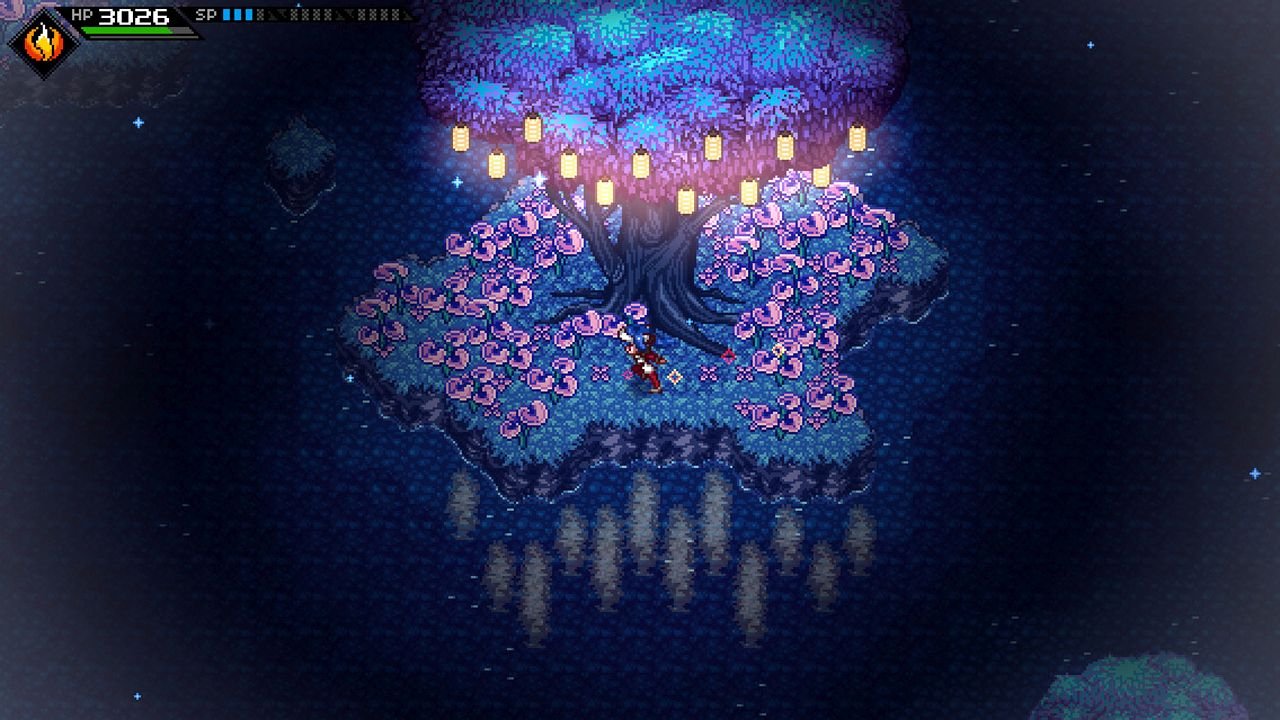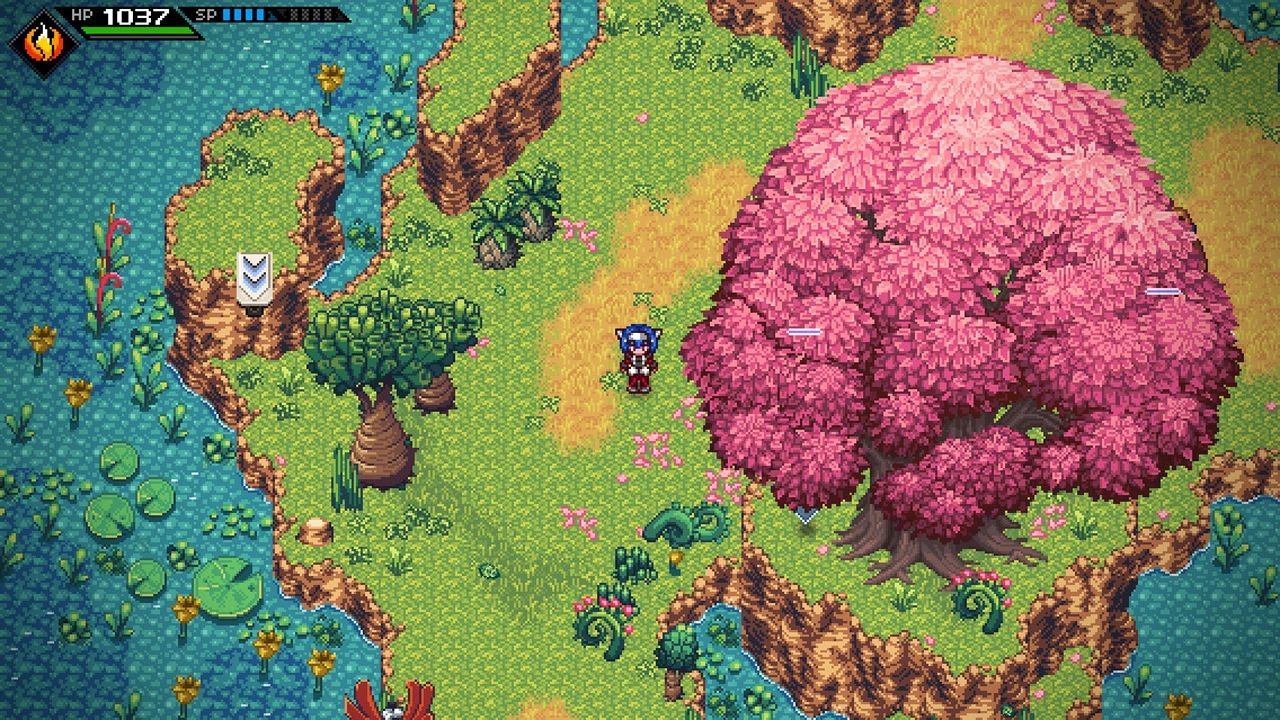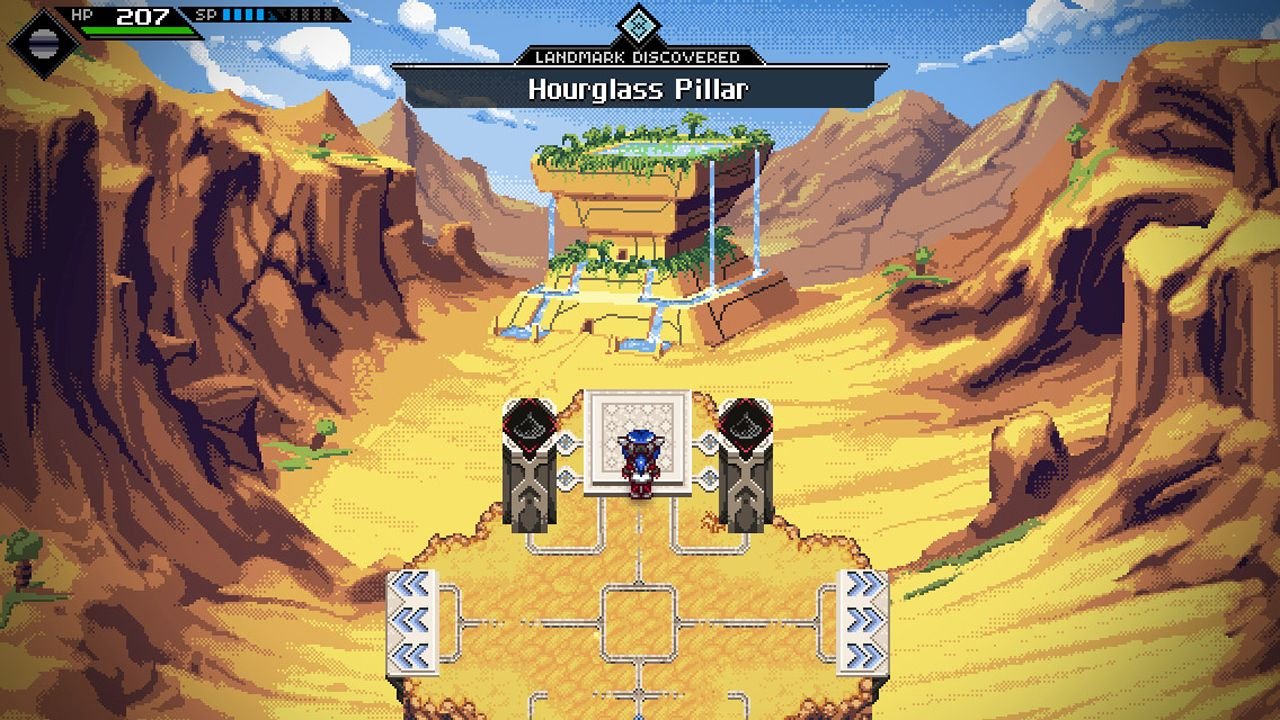CrossCode has been one of the most highly anticipated Switch releases for some time now. The “faux MMO” action RPG was first released on PC/Mac/Linux in late 2018 before being teased for Switch in the future. Finally, after a year and a half wait, CrossCode released to modern consoles on July 9th.
So, how is it? CrossCode released to critical acclaim with its first run, but how does it actually fare on the Nintendo Switch? While I cannot attest to the package as a whole just yet – I'm only 15 hours into what could easily be a 30+ hour campaign – things are looking exceptional… for the most part.
What Is CrossCode?

CrossCode is a 2D action RPG that takes place in an MMO known as “Crossworlds.” Simulating an actual MMORPG (Massively Multiplayer Online Roleplaying Game), Crossworlds is full of avatars that represent “real people” playing alongside the player, in addition to a plethora of NPCs that help bring the world to life. If you've played any of the .hack or Sword Art Online games, then this should be a familiar concept.
The player-controlled avatar, Lea, is cut from a different cloth, however. You assume control of her only to soon discover that she has been stricken with amnesia and, due to a glitch in the game system, begins her Crossworlds journey as a certified mute — double bummer. Fortunately, Lea receives some guidance on how to restore her memories, which are said to be locked away within the game itself.
The role in which Crossworlds plays in memory recollection remains unclear, but it is essential that Lea keeps her personal demons under wraps in order to prevent drawing unnecessary, or malicious, attention. The amnesia-stricken protagonist is a trope as old as time, but the unique “faux MMO” setting certainly helps to make it far more interesting.
There is a lot of mystery surrounding the narrative right out of the gate, with a short scenario playing out in the prologue – not to be spoiled here – that will have you mulling over theories only a few minutes into the experience. That said, only time will tell whether the plot actually holds up (or goes anywhere) over the course of this reportedly multi-dozen hour adventure.
Gameplay

Whether you care about stories or not, MMOs – even those of the faux variety – live and die by their gameplay loop, and CrossCode is no exception. The virtual land of Crossworlds provides what you would expect from any MMO worth its salt – friendly players, dangerous foes, bustling cities, and a metric ton of fetch quests.
Lea will make friends along the way that she can “party up” with, providing some much-needed backup as you explore the multitude of area brimming with hostile creatures. In town, you will run into other “players” going about their own business, find trading posts that are willing to exchange materials for powerful items, and run into NPCs that just can't wait to unload their laundry list of chores on unsuspecting players (ie. you).
Directionally Challenged?
If none of the “fluff” interests you, there is a primary objective that Lea (as a “Seeker”) must achieve in-game, though details of that are beyond the scope of these impressions. Needless to say, there are a lot of things the player can do at any given time, often without a necessary or specific order, but this lack of a distinct direction (and slower pacing as a result) may come as a slight detriment to those more accustomed to a faster paced experience. Objectives have recommended level ranges, and it is entirely possible that you could have a terrible time completing certain ones if you don't stop to smell the roses from time to time.
And by that, I mean killing hordes of enemies.
Combat

CrossCode utilizes a fast-paced (but simple) combat system. Lea has access to both a base melee and ranged attack, as well as a dash that can be used (depending on loadout) offensively and defensively. The Circuit system acts as a skill tree, opening up a bit more depth to the player's combat repertoire in addition to providing some powerful passive bonuses. It isn't anything crazy, mind you, but does help flesh out an otherwise basic combat system.
Most enemies have one or more weaknesses that can be exploited to make things a bit easier – and you should, considering some foes can hit like a truck. Intelligent use of this knowledge, your surroundings, and, of course, your actual decisions in-combat are key to success.
Puzzles
CrossCode has its fair share of puzzles, too, most of which require you to think vertically and occasionally take advantage of your wall-bouncing ranged attack. While many of these are easy to solve – so far, at least – others will challenge you, especially those found in dungeons and certain ones that require you to follow a specific path in the open world.
In this way, the verticality of each area is both a blessing and a curse; it adds a level of depth to each area that you wouldn't expect from most 2D, top-down games, but it can be frustrating when hunting down that single, obscure ledge in order to progress certain events.
Presentation

Fans of retro design are in for a real treat here. CrossCode is easily one of the most beautiful games (in this style) I've ever played, with each location having its own distinct look and feel. They don't skimp on the details either; climbing a mountain range, for example, can gradually go from lush foliage to a snowy landscape.
The only real complaint here, besides performance woes (explained later), is how hard it can be at times to know exactly where you are in any given zone. This is primarily due to a lack of consistent and meaningful landmarks in each zone, as well as the segmented design in general, but you can easily pull up your map any time while outside of combat.
Sound
The soundtrack is equally nostalgic and excellent. Deniz Akbulut's score brings a new (yet familiar) spin to the mix, with an assortment of sci-fi-infused tunes that range from “chill” to “blood-pumping.” Have a listen for yourself!
Setting
The sci-fi approach, in general, is quite welcome in this world where Medieval-inspired settings can often become “samey” due to their frequent usage. Crossworlds really feels like an actual MMO world thanks to how both “friendly players” and NPCs react to your character. Listening in on some conversations between other “players” boasting about achievements or lamenting about difficult tasks ahead really ups the immersion factor here.
Concerns
CrossCode, as polished as it is, does have a few issues on the Switch.
As of this writing, there are a number of areas that bog down the framerate drastically, and this starts in the very first hub area and unfortunately doesn't end there. So far, it hasn't dipped so low as to affect the actual gameplay, but it remains an annoyance either way.
There are some audio issues, too, most notably when bringing the Switch out of suspension or when the music loops in any of the performance-dampened zones – a slight delay in its continuation is a reminder that things aren't quite right.
Those issues, annoying as they may be, are easily dealt with, but there is one that is a bit more troublesome. There is a menu item that is supposed to pull up a master list of all the traders you've come in contact with – a boon, for sure – but I have yet to open it without crashing the game. I have tried everything but completely reinstalling the game, all to no avail. If this bug is something that goes beyond on my own console, then it should be fixed as soon as possible.
Conclusion

Concerns aside, CrossCode has really impressed me so far. As a longtime fan of MMOs, the “faux MMO” approach is something I connect with immediately despite not being the biggest fan of some of the other games it has likely drawn inspiration from, a la the previously mentioned .hack and SAO series. There's something magical about the formula at work here, and though some of the performance issues are concerning, it is clear that CrossCode is shaping up to be an exceptional title.
Have you jumped into CrossCode yet? If so, what are your own impressions? Have you run into the same issues that I outlined above? I hope not, but let me know either way!

